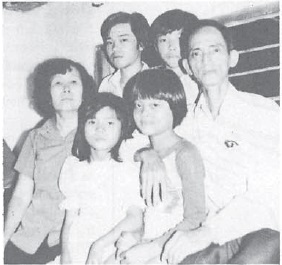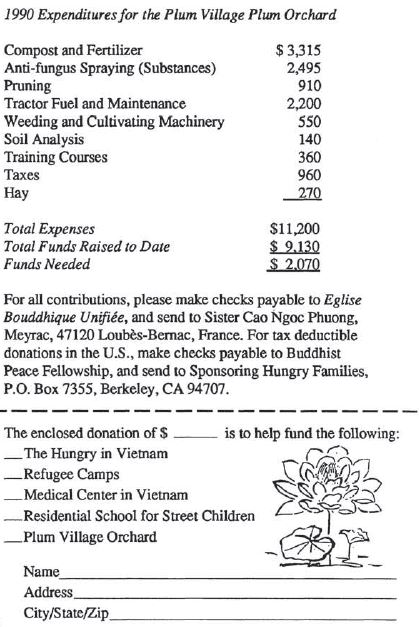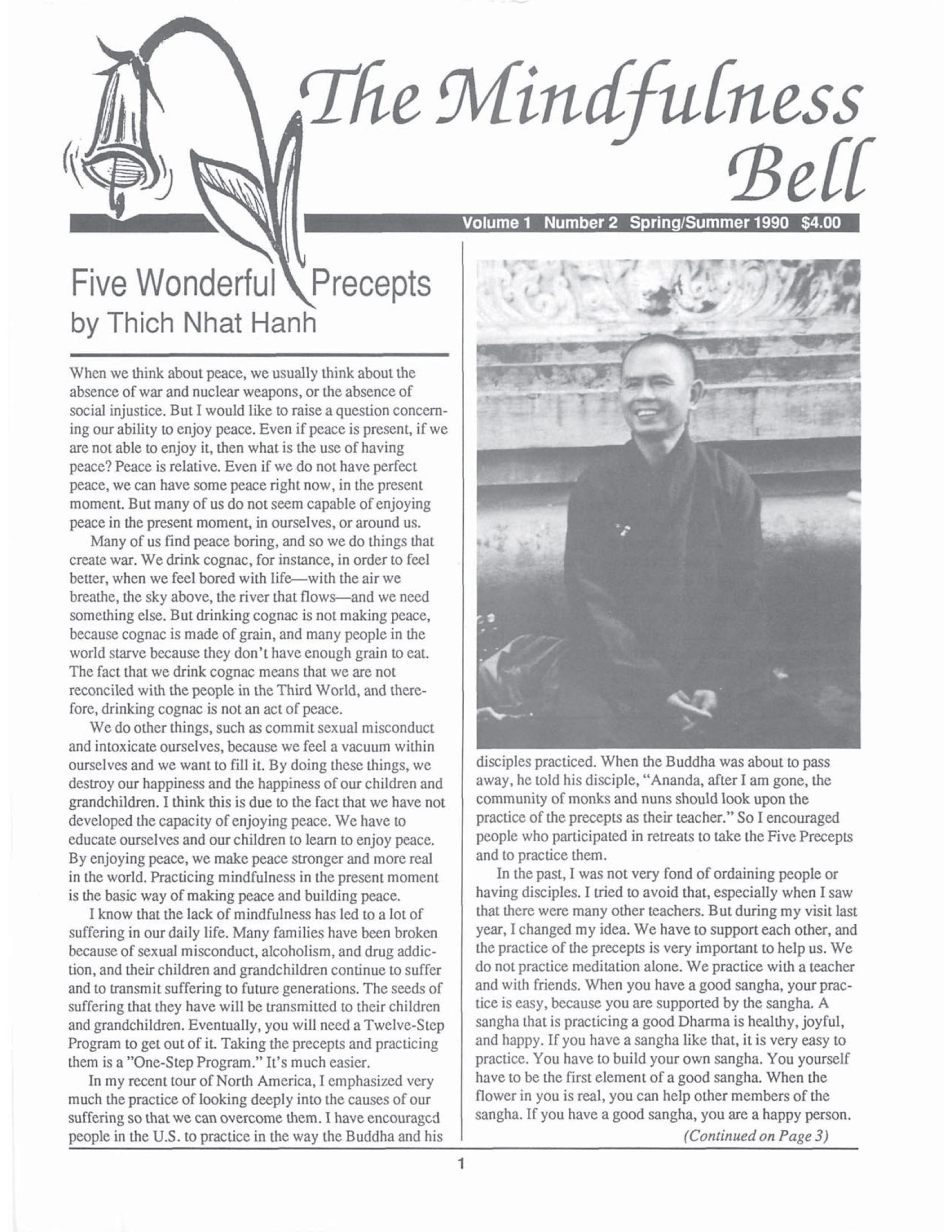By Cao Ngoc Phuong
Fourth Precept of the Order of lnterbeing
“Do not avoid contact with suffering or close your eyes before suffering. Do not lose awareness of the existence of suffering in the life of the world. Find ways to be with those who are suffering by all means, including personal contact, visits, images, sound. By such means, awaken yourself and others to the reality of suffering in the world.”
By Cao Ngoc Phuong
Fourth Precept of the Order of lnterbeing
"Do not avoid contact with suffering or close your eyes before suffering. Do not lose awareness of the existence of suffering in the life of the world. Find ways to be with those who are suffering by all means, including personal contact, visits, images, sound. By such means, awaken yourself and others to the reality of suffering in the world."
Editor's introductory note: The question of how we can open ourselves to the suffering of others without being overwhelmed is a daily one. Fortunately, we have teachers like Thay and Sister Phuong who demonstrate how natural compassion can be. We don't need to resist being aware of our own suffering or the suffering of others. We needn't fear being overwhelmed. We can work steadily to become more aware, trusting that solutions and ways of responding will come to us, if we keep our eyes and hearts open. As Thay writes in his commentary on this precept in Interbeing, "awareness of suffering makes us search for its cause." I have found in my work with Sponsoring Hungry Families that much empowerment comes out of the commitment to work towards a better life for all.
We do not do this work alone. As Nelson Mandela has said, "Problems can only be solved if one is part of a team." Let your heart be warmed by this example of teamwork: This past January, Karen Holden, longtime supporter of the Sponsoring Hungry Families program, invited her friends to "begin the new decade together" and she proposed giving away her paintings from the '80s "for any amount offered," with the proceeds (which came to more than $2000) going to feed the hungry in Vietnam. "This is my way of saying 'thank you' for all the nourishment you've given me these past three years," Karen wrote her friends. Big-hearted Karen thanked us "for the opportunity to feel so connected to a 'distant' geography, that is right here in my heart."
Another member of the team, Phu Bui, who helps translate letters from our friends in Vietnam wrote: "The letters remind me of memories from about ten years ago when my brothers and sisters wrote me. They were in the similar desperate circumstance as the people you are helping. My family is now better, but there are still many who need help. Thank you for giving me an opportunity to contribute a little and especially to share the misery of the people. I hope someday Vietnam will be a free country and we can help more people more easily."
In the following report, Sister Phuong gives an overview of the work in several countries to assist the hungry in Vietnam, as well as a thorough report of Plum Village' s efforts to bear witness and respond to the suffering of those deprived of basic human rights in Vietnam and refugee camps throughout southeast Asia.
--Therese Fitzgerald

The Hungry in Vietnam
Worldwide, our four committees in Plum Village, Switzerland, Paris, and California now sponsor more than 600 families in Vietnam. We send three parcels per year to each family, and each parcel costs from $45-$60, including postage. Following are excerpts of letters from recipients of the parcels:
Letter from Phan, November 9, 1989:Dear Sister, I was on the point ofdespair because there was no morerice in the house for the next day'smeal, when the postman told me thatyour parcel was waiting for me at the post office. Dear sister, I can already smell the perfume ofthe cooked rice and hear the cries of happiness of my twosons. It will be plain rice--no tofu, eggs, or vegetables, simply a little salt and pepper--but that is already wonderful.
Because the amount of hardship is endless, we only sponsor each family for two years to give them a little capital to help boost their budget. Phan is just one of those cases. He was burned by a napalm bomb during the war and his face is nothing but a mass of wrinkled skin and bumps, which is why his wife has left him and their two children. He does not have that much intelligence or skill to be able to do anything other than cultivate rice.
Letter from Sister Q, August 20, 1989:
We havejust come back from Quang Nam in Da Nang.Thanks to the cooperation of young Buddhists in the area,the distribution of supplies is quick. In theplaces which were subject to the floods and the tornado, the uprootedtrees and the ruins of the houses are in exactly the same state as after the disaster. It is a pitiable sight. On the islandof Cham, 400 people are still missing. Another town lost 200 people. We managed to obtain transportation and a permit (something which has only just become possible after14 years of "liberation" under the new regime) to distribute huge quantities of food and supplies. Still, we had the impression that it was only a drop in an ocean of wretchedness. All of us were moved to tears and wept along withthose who had been victims of that disaster. We promised tocome back as soon as we were able to get together another load of supplies. We hope that we shall be able to get backon time and that there will not be any more deaths beforeour next visit.
The team made a second visit to this area. We hope we shall have enough money to be able to buy 1,000 blankets and enough seed rice for the farmers next season. Please send any help you can for these people as soon as possible.
Refugees
1989 has been notable for the great difficulties caused by the unwillingness of the Hong Kong authorities to accept refugees. Of the 57,800 refugees who arrived on the shores of Hong Kong up until August 1989, only 11,000 have been allowed official refugee status which gives them the chance of being interviewed by the United States, Australia, or a country in Europe, to live in one of these countries. Those who do not receive official refugee status are threatened with forced repatriation back to Vietnam, and there is reason to believe that they will be at some risk upon return.
Along with our efforts to bring this matter to the attention of the appropriate authorities, we also support a voluntary social worker in Hong Kong who has practiced meditation in Plum Village. She offers the refugees food and supplies and also provides them instruction and written materials about how to be calm and practice mindfulness and relaxation in the midst of the very tense atmosphere of the camp.
Most of the temporary camps for "non-refugee" boat people are on formerly deserted islands. More than 5,000 refugees are forced to live on their frail boats, and the marine police only bring them a few dry crackers and a quart of water once a day. Our social worker brings supplies to these people. In 1989, we were able to send her $2,000, which is nothing compared with the immense suffering and needs of these people, but at least they do not feel totally abandoned by the human family. We have also sent financial assistance to people the Pulau Bidong camp in Malaysia ($2,250),and to the Panat Nikhom camp in Chonburi, Thailand ($2,500).
Other Projects
A number of our social workers arrested during their work to help people in starvation areas were recently released. Among them, Sister Hoang Lien, arrested on in July 1986, was released from women's camp Bo La T.40 in August 1989. She has gone back several times to take urgently needed supplies to the women imprisoned there for more than ten years who have no close relatives to bring them food. She also wants to set up a home for street children who are virtually delinquent and may become criminals in the future. Former workers of the School of Youth for Social Service have begun to contact us for support for similar projects: shelter and education for children who live on the streets, and medical centers.
There are four projects in progress which are truly worth supporting: two medical centers in Hue, both of which are under the direction of doctors who graduated before the advent of the new regime, and two centers for helping street children in Saigon. A medical center needs $500 per month to function. If you want to help sponsor one of the four centers, please contact me. I will give you the details and an address.
Plum Village Orchard
The sangha's concern for the more than 1,200 plum trees has begun to have a wonderful effect on the orchard. I wish the kind sangha of friends could have seen the millions of flowers on the trees this past Spring. Jean-Paul Benabid is now devoting his full-time attention to the care of the orchard, with the help of the Plum Village community. We have been happy to discover that there are five organic farmers in our area. Thanks to your generosity and thoughtfulness, these trees, now seven years old, will bear fruit and sustain the work of feeding the hungry. Special thanks to Allan and Marion Hunt-Badiner, Tara Lamont, and Anne Bartley for their generous donations which have allowed us to take care of the orchard so well.


